Ray Bradbury, one of the celebrated 20th century writers, once famously wrote, “half of the fun of travelling is the aesthetic of lostness”. You may interpret it in your own way, but one thing is certain that he meant to say travelling is extra rewarding because it takes you to some exotically uncharted places that you in your wildest imagination didn’t know existed. Travelling to faraway lands is undoubtedly a fascinating and thrilling experience, but at times there are some unwanted stumbling blocks that hamper your prospects of exploring wanderlust around the world.
In recent times – during Covid-19 pandemic – the travel industry was one of the hardest hits and witnessed the lowest of low. It is mainly in the post-pandemic world that the travel industry digitized itself by making its robust presence onto the online platform. Ever since online travel booking has seen unprecedented growth. According to the latest statistics the online traveling industry is expected to reach $4.6 trillion by 2023 with a 10.58% compound annual growth rate (CAGR). In the backdrop of this growing digitization of the travel industry, flight ticket booking apps have become immensely popular.
You might be thinking that what it takes to develop a flight ticket booking app and what a credible app development entail. Do not need to look elsewhere. In this blog we will walk you through the nitty-gritties from benefits, types, features, and costs etc.
What is a Flight Booking Mobile App?
It goes without saying that, in face of the rapid technological advancements, the advent of flight booking mobile apps has revolutionized the travel industry, reshaping how individuals plan and execute their journeys. These applications, accessible via smartphones, serve as digital platforms that facilitate seamless flight ticket searching, comparison, and booking processes. The transformative impact of these technology-driven solutions extends benefits to both users and businesses in the travel sector.
Benefits of Flight Booking Mobile App
The growing popularity of flight booking mobile apps can be attributed to a myriad of advantages, including the following:
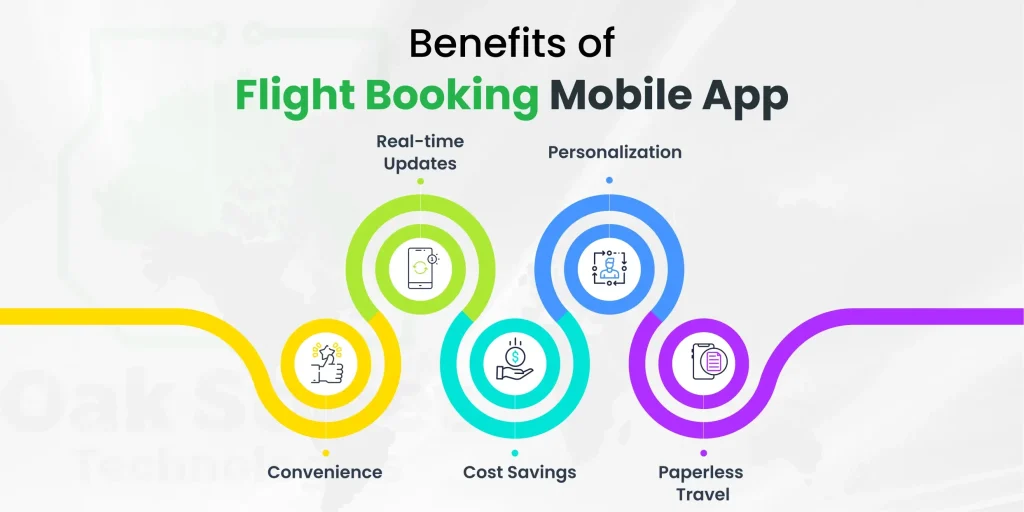
Convenience: Users can book flights with much ease, at their convenience, eliminating the constraints of physical travel agencies or desktop-based bookings.
Real-time Updates: These apps facilitate users with crucial real-time information on flight schedules, delays, and cancellations, ensuring a smooth travel experience.
Cost Savings: By enabling users to compare prices across different airlines, these apps empower individuals to find the best deals and discounts, resulting in significant cost savings.
Personalization: Flight booking apps offer customized travel preferences and notifications, enhancing the overall user experience and making the app more user-friendly.
Paperless Travel: The adoption of e-tickets and digital boarding passes contributes to environmental sustainability while streamlining the check-in process.
Why Should You Invest in a Flight Booking App – Market Stats?
Investing in a flight booking app is not merely a strategic move but also a financially rewarding one, as corroborated by the latest market statistics. According to the latest statistics, the global revenue from online travel bookings is an impressive $2.3 trillion in 2023 that underscores the immense potential for growth within the travel tech sector. Furthermore, the ubiquity of smartphones plays a pivotal role in the success of flight booking apps. With an estimated 6.92 billion smartphone users worldwide in 2023, these apps cater to a vast and diverse user base.
Top Flight Booking Apps & Websites
There are currently several flight booking apps and websites that dominate the market, offering users a diverse array of options. However, among them, as of the latest data, the following platforms have gained prominence:
Expedia: Renowned for its comprehensive travel platform, Expedia enables users to book flights, hotels, and car rentals seamlessly.
Skyscanner: Distinguished by its powerful search engine, Skyscanner empowers users to find the best flight deals across multiple airlines effortlessly.
Kayak: Beyond flight bookings, Kayak provides users with travel-related information and tips, enhancing the overall travel planning experience.
Google Flights: Leveraging Google’s extensive database, this app provides users with a seamless flight booking experience, integrating convenience and efficiency.
Business Models of Flight Booking Mobile Apps
There are various business models of flight booking mobile app including the following:
Aggregator Model
The aggregator model involves collaborating with various airlines and consolidating their offerings on a single platform. Apps following this model, such as Skyscanner and Kayak, provide users with a comprehensive solution, allowing them to compare and select the most suitable flight options. It is a broader and more open model comparatively.
Dedicated Model
In contrast to aggregators, the dedicated model is associated with specific airlines or travel agencies. Examples include individual airline apps like Delta or Emirates. These apps focus exclusively on promoting and selling services offered by a particular airline or agency. Although it is relatively limited, its worthwhileness is enhanced by the exclusivity its offer to a particular agency or airline.
What Do Customers Want in their Flight Ticket Booking App?
Understanding customer preferences is paramount for the success of a flight booking app. Research and studies into customer preferences show the following features that top the list of customer expectations:
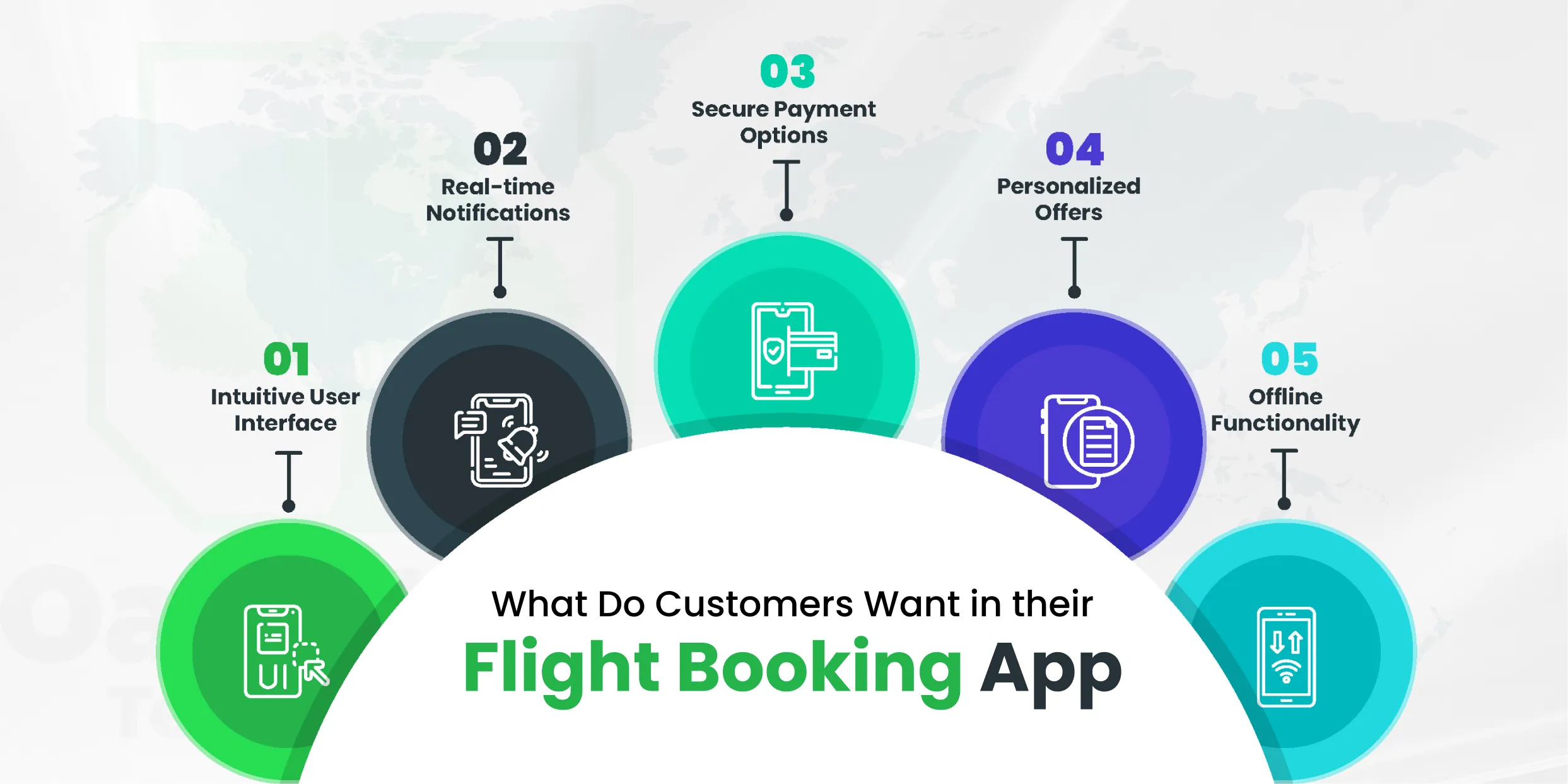
Intuitive User Interface: Users prefer an easy-to-navigate interface that simplifies the flight booking process, ensuring a user-friendly experience.
Real-time Notifications: Instant updates on flight status, gate changes, and other relevant information contribute to a seamless and informed travel experience.
Secure Payment Options: A variety of secure payment methods enhances trust and convenience, crucial elements in ensuring a positive user experience.
Personalized Offers: Tailored promotions and discounts based on user preferences and travel history make the app more appealing and user centric.
Offline Functionality: The ability to access and view bookings even without an internet connection is considered a valuable feature, addressing potential connectivity issues during travel.
General Features to Include in Flight Booking Apps
Apart from the quintessential features, there are some general features as well that add to be efficacy and productivity of the app. Some of these features include:
Customer Panel Features
There are various customer panel features that help a great deal in enhancing the app’s productivity and utility, some of them include:
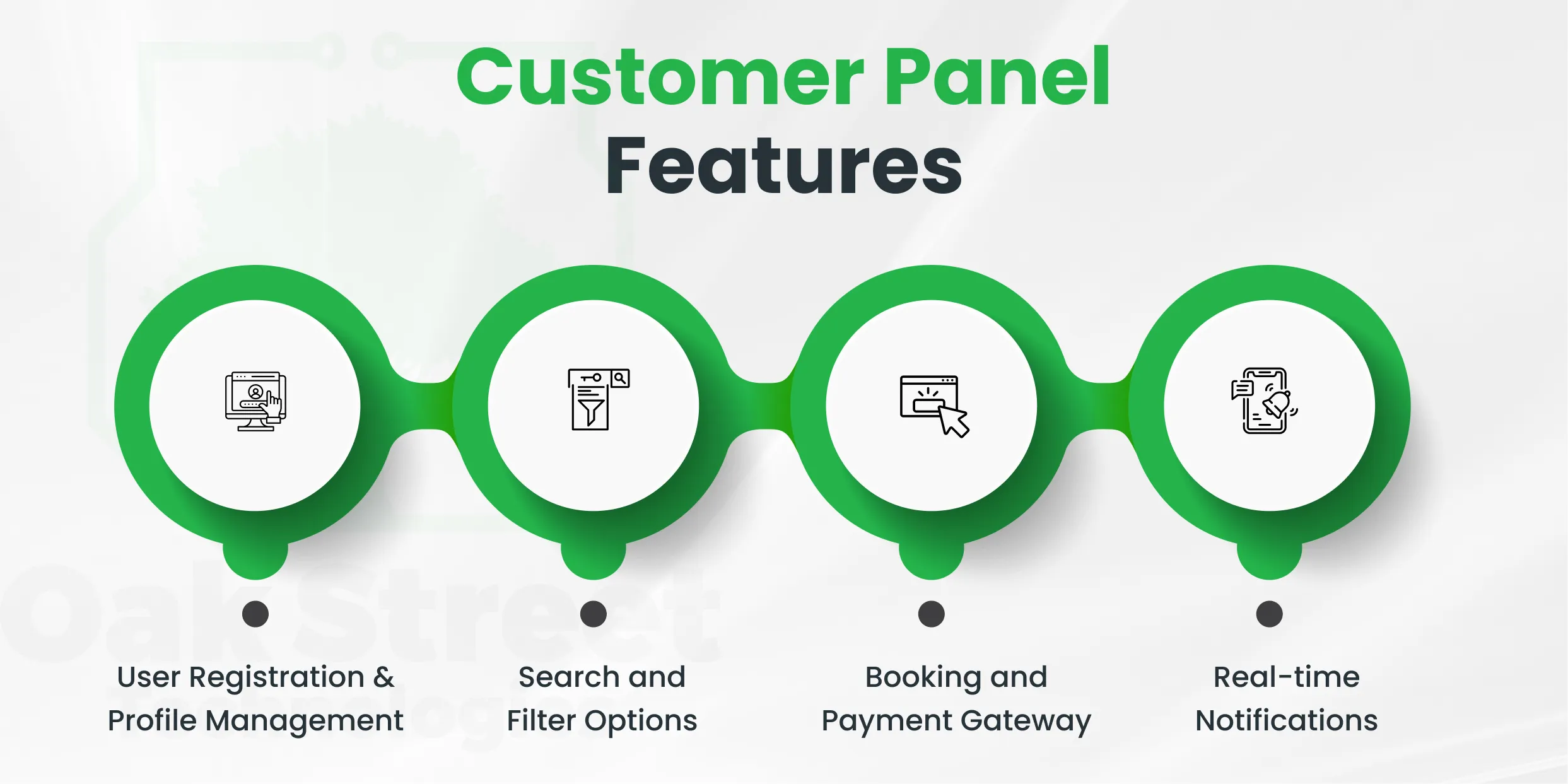
User Registration and Profile Management: Seamless onboarding and profile customization facilitate a user-friendly experience from the start.
Search and Filter Options: Efficient tools for users to find suitable flights based on their preferences, streamlining the booking process.
Booking and Payment Gateway: A secure and user-friendly system for effortless bookings and transactions, ensuring a seamless payment experience.
Real-time Notifications: Instant updates on booking confirmation, flight status, and other relevant information enhance user engagement and satisfaction.
Admin Panel Features
Admin Panel features also contribute to the app’s usefulness, which include the following:
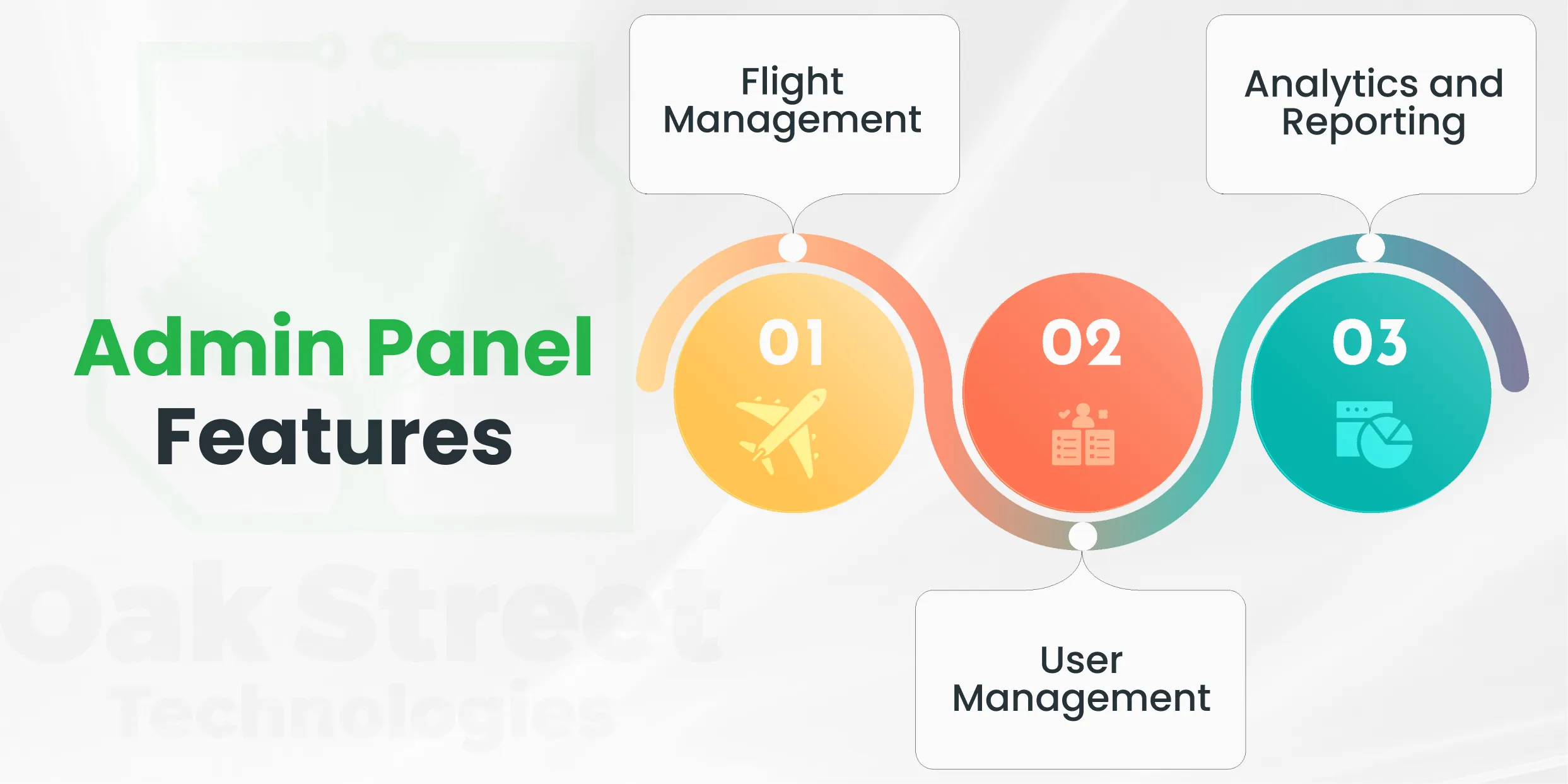
Flight Management: Tools to manage flight schedules, availability, and pricing, providing administrators with control over the platform’s offerings.
User Management: Admin controls for user accounts, permissions, and support, ensuring efficient management of user-related processes.
Analytics and Reporting: Data-driven insights for better decision-making and strategy planning, allowing administrators to adapt and optimize based on user behavior and market trends.
Technology Stack for Flight Booking Apps Development
It is of high importance to factor in the technology stack for flight booking apps. Some of the important tech stacks, in this regard, include the following:
Front End (For Mobile Apps & Websites)
Choosing the right programming languages is crucial. To this end, using Swift for iOS and Kotlin for Android for native mobile app development is highly efficacious. For cross-platform development, it is advisable to go with frameworks like React Native or Flutter. Likewise, user Interface (UI) design should also be factored in cautiously. Employing popular design tools such as Sketch or Figma is highly availing for creating intuitive and visually appealing interfaces that enhance the user experience. Also, using augmented reality (AR) frameworks could level up the game for the better. In this regard, consider implementing AR features using frameworks like ARKit for iOS or ARCore for Android. Last but not least, voice recognition API integration could uplift the app to the whole next level. Integration of third-party voice recognition APIs such as Google Cloud Speech-to-Text or Apple’s Speech framework are of incredible significance, making your app of utmost efficacy and effectiveness.
Back End (Mobile Apps & Website)
Likewise, backend also plays a key role. While choosing server-side programming it is of vital utility to use server-side languages like Node.js, Python, or Ruby on Rails to handle the logic and functionality of the back end. For database management system (DBMS), choosing reliable databases like MongoDB, PostgreSQL, or MySQL is highly recommended for they help to store and manage user data, flight information, and other essential records. Likewise, from API integration perspective, try connecting your app with third-party APIs of airlines, payment gateways, and other travel-related services to ensure real-time data updates and seamless transactions. Lastly, leverage cloud platforms such as AWS or Azure for scalable and secure storage, ensuring optimal performance during peak usage periods.

Flight Booking App Development Process
Creating a successful flight booking app is a meticulous endeavor that follows a comprehensive development process, involving several key stages. These stages are crucial for ensuring a seamless and user-friendly experience for app users.
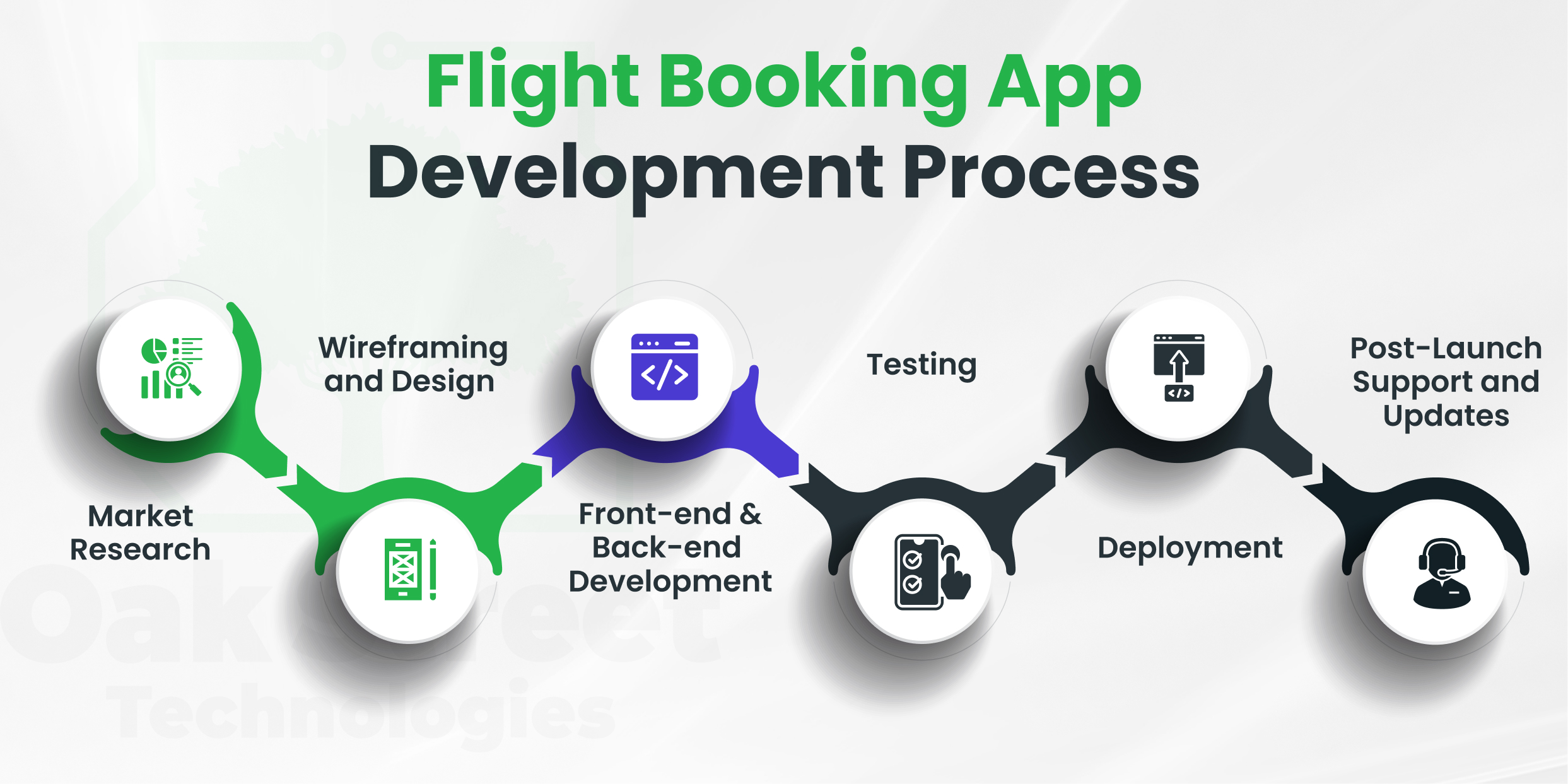
Market Research
The initiation of the development process begins with extensive market research. This phase involves a detailed analysis of the target audience, competitors, and current market trends. The goal is to identify unique selling points and potential opportunities for innovation within the flight booking app domain. It is a crucial step that sets the tone and defines that roadmap for your map, so it needs to be given due consideration.
Wireframing and Design
Once the market research is complete, the next step is the creation of wireframes and design prototypes. These visual representations serve as a blueprint for the app’s structure and user interface. The emphasis here is on adopting a user-centric approach to design, ensuring an intuitive and visually appealing interface. Make sure that visual aesthetics and user-centricity are at the heart of good wireframing and design.
Front-end and Back-end Development
Here comes the actual rigmarole, which is at the heart of the whole process. Simultaneously, the development team engages in both front-end and back-end development. The front end is constructed using selected frameworks and programming languages, focusing on the user interface and overall user experience. Meanwhile, the back-end handles server-side logic, database management, and integration with various APIs to ensure smooth data flow and functionality. An expert team of developers through coding breathe life into the app tailoring it to cater to your ticketing booking needs. Make sure that the better the coders, the smoother the functioning of the app is in the longer run. OakStreet Technologies, in this regard, is a name to reckon with for it has the track record of coding some of the most sophisticated and complex apps for worldwide clients.
Testing
A critical phase in the development process is testing, where various aspects of the app are rigorously examined. This includes functionality testing to ensure all features work as intended, usability testing to evaluate the user experience, and security testing to identify and rectify potential vulnerabilities. Thorough testing is imperative to address any issues before the app is launched and to ensure that it works seamlessly post-launch.
Deployment
Following successful testing, the app is ready to be deployed on app stores and web platforms. Special attention is given to ensuring a smooth and user-friendly installation process for users. Deployment marks the transition from development to the app being accessible to the target audience. It is where the end users get to use it as desired.
Post-Launch Support and Updates
Even after the app is launched, the development team’s involvement continues. Ongoing support is provided to address user feedback and promptly resolve any issues that may arise. Regular updates are implemented to enhance existing features, introduce new functionalities, and fix any potential bugs. This post-launch phase is crucial for maintaining the app’s relevance and competitiveness in the dynamic market landscape.
Factors Affecting the Cost of a Flight Booking App Development
While the development process is crucial, understanding the factors influencing the cost of a flight booking app is equally important. Several variables contribute to the overall expenses, including the following:
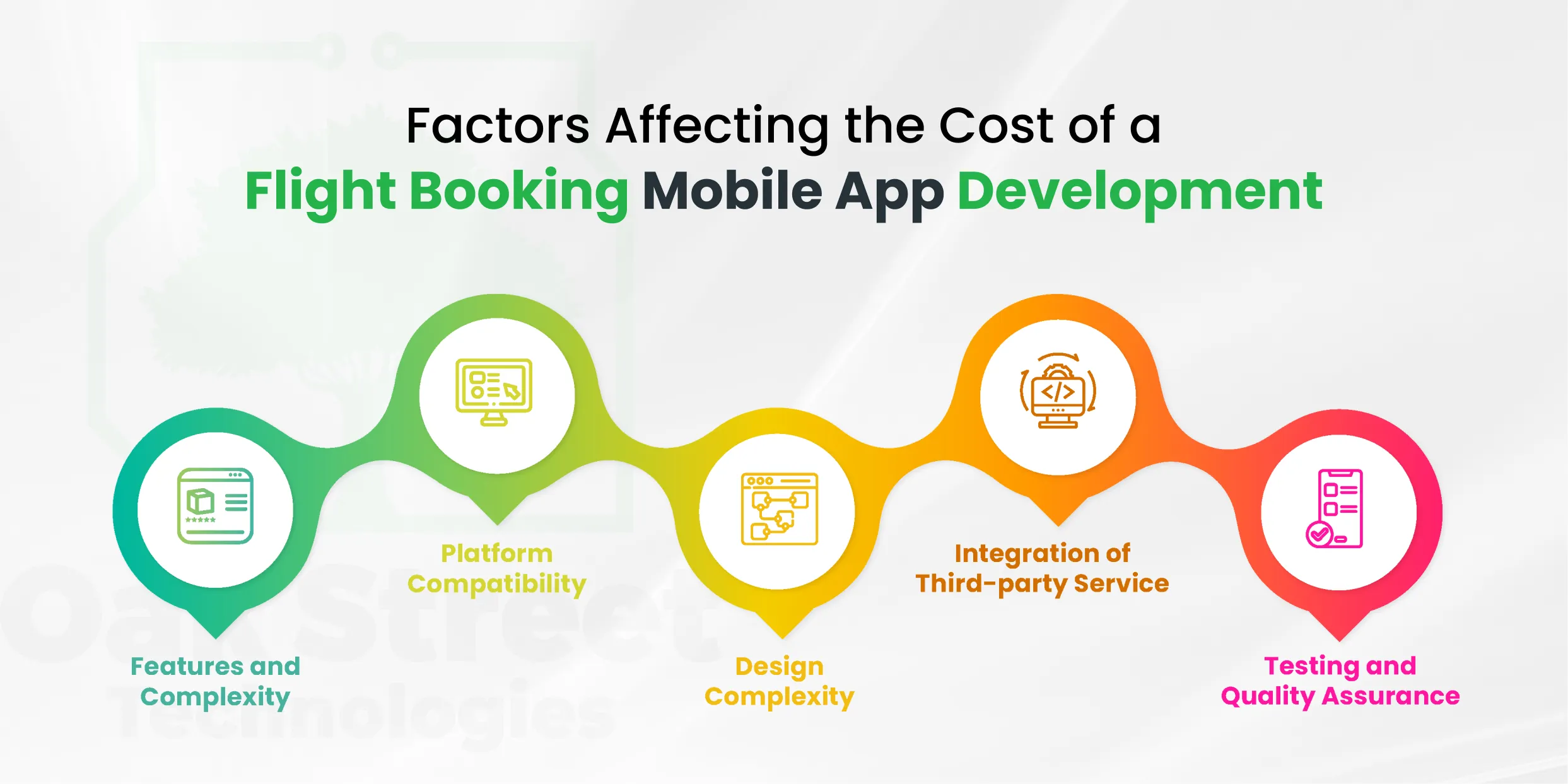
Features and Complexity: The inclusion of advanced features and the overall complexity of the app significantly impact development costs.
Platform Compatibility: Developing for both iOS and Android platforms or opting for cross-platform solutions may affect the budget.
Design Complexity: Elaborate and intricate UI/UX designs may require more resources and, consequently, increase development costs.
Integration of Third-party Services: Incorporating various APIs, such as payment gateways and airline services, may add to the overall development expenses.
Testing and Quality Assurance: Rigorous testing and quality assurance processes contribute to a higher upfront cost but ensure a robust and bug-free application.
How Much Does It Cost to Develop a Flight Booking App
Estimating the precise cost of developing a flight booking app is a complex task, given the multitude of factors that influence the overall expenses. Industry estimates suggest that the cost can vary significantly across the region. On average, the development cost of a flight tickets booking app costs around $40,000 to $300,000 or more. This wide range reflects the diverse nature of projects, with complexity and features playing pivotal roles in determining the final cost.
Cost Breakdown Across Regions
The cost of app development can vary across regions due to differences in labor costs, expertise, and market demand. Here’s a general breakdown of estimated costs for developing a flight booking app across different regions:
Region Basic Features ($) Mid-range Features ($) Advanced Features ($) North America $60,000 - $80,000 $100,000 - $150,000 $200,000 - $300,000 Europe $50,000 - $70,000 $80,000 - $120,000 150,000 - $250,000 Asia-Pacific $40,000 - $60,000 $60,000 - $100,000 $120,000 - $200,000 Latin America $30,000 - $50,000 $50,000 - $80,000 $100,000 - $150,000
Please note: These figures are approximate and can vary based on specific project requirements and the choice of development partner.
Factors Influencing Cost
There are myriad factors that influence the overall cost of an app, including the following:
Basic Features
These are foundational features that form the core of any flight booking app. Users expect a seamless booking process, efficient search capabilities, and secure payment options. Development costs at this level typically fall within the lower end of the spectrum.
Mid-range Features
As we move towards more sophisticated functionalities, additional features come into play. Real-time updates on flight status, user profiles for personalized experiences, and basic AI integration to enhance user engagement contribute to a moderate increase in development costs.
Advanced Features
The inclusion of advanced features significantly elevates the complexity of the project. Augmented Reality (AR) for enhanced visualization, voice recognition for hands-free interaction, predictive analytics for personalized recommendations, and sophisticated AI-driven features for an intelligent user experience are considered advanced. Consequently, these features contribute to the higher end of the cost spectrum.
Collaborating with Experts for Accurate Estimates
To obtain a more accurate estimate tailored to specific project requirements, collaborating with experienced app developers or development agencies is highly advisable. Their expertise allows for a detailed assessment of the project scope, considering the unique features, functionalities, and complexities associated with the desired flight booking app.
Looking for the Exact Cost to Build a Flight Booking App?
Wrapping Up
In a nutshell, the development of a flight booking app involves a meticulous process that combines advanced features, a robust technology stack, and a clear understanding of user preferences. With the travel industry poised for continuous growth, investing in the development of a feature-rich and user-friendly flight booking app presents a lucrative opportunity. Understanding the factors influencing costs and the intricacies of the development process is vital for creating a successful and competitive product in the dynamic landscape of travel technology. As technology evolves, the future of flight booking apps holds exciting possibilities, promising an even more seamless and personalized travel experience for users around the globe.
The crux of all of it is that for a hassle-free flight ticket booking experience, an app is simply invaluable. You might get daunted by the materialization of it, but with OakStreet Technologies being on your side you need not worry a bit. Our acclaimed app development services are town of the talk for their top-notch quality, unmatched scalability and technology-driven innovation. Just drop a line to discuss your peculiar needs and let our experts bring your ideation to life!
Frequently Asked Questions (FAQs)
How much does it cost to develop a flight booking app, and does it vary by region?
How long will it take to develop a flight ticket booking app?
How can I get an accurate cost estimate for developing a flight booking app?
Collaborating with experienced app developers or development agencies like OakStreet Technologies, is recommended for obtaining a more accurate estimate tailored to specific project requirements. Their expertise allows for a detailed assessment of project scope, features, and complexities.



